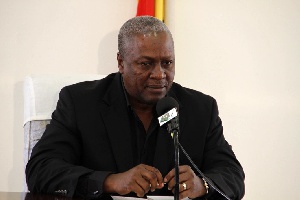Stakeholders at a meeting on the establishment of the Western Corridor Development Authority (WCDA) over the weekend identified the collapse of the railway system as contributing largely to the slow development of the region.
The stakeholders, made up of Metropolitan, Municipal and District Chief Executives (MMDCEs), traditional authorities, heads of departments and the Civil Societies stressed that, the collapse of the rail system was impacting negatively on the socio-economic activities of the area, and that, there was the need for government to consider budgeting for the rehabilitation of the lines to facilitate development in the region.
They noted that in the absence of the rail lines, heavy duty vehicles continue to ply the roads conveying bulky goods from the mining sites to the port and vice versa leading to the fast deterioration of the road net work.
This normally results in the piling up of food stuffs and cocoa in the hinterland, especially during the rainy seasons.
They were not happy that though the region contributes largely to the nation’s Gross Domestic Product (GDP) it is the least developed among the ten regions.
The Western Region produces mineral resources such as bauxite, gold, manganese, cocoa, which is the country’s main foreign exchange earner, coffee, timber, foodstuffs and recently oil and gas.
They noted that the plan for the Western Corridor had been placed on the table for far too long and that it was about time the project was implemented for accelerated growth to meet the current challenges.
Mr Steve Akuffo of the National Development Planning Commission made a presentation of the spacial frame work of the establishment of the Corridor and called on citizens of the region to ensure its implementation by wooing investors to take up the projects.
He said the government alone cannot shoulder all these responsibilities and urged the chiefs and influential people to spearhead the implementation of the projects to get government’s support.
The District Chief Executives in the northern part of the region noted that, most developments were centered in the regional capital and its environs, whilst those in the hinterland were left undeveloped and called for the decentralization of development to cover all those areas.
The Western Regional Minister, Mr Paul Evans Aidoo, noted that, before the production of oil and gas in the region, the dominant economic activities were agriculture, including cocoa production, forestry and mining, which is beneficial to the whole nation.
“However, the challenges which accompany the operations have not been sufficiently addressed, especially by the profit –oriented entities exploiting these resources”.
Mr Aidoo expressed regret about the fast deterioration of the environment and the pollution of river bodies by unscrupulous people and companies, saying that, the income arising from these activities go to some companies and individuals “who do not even pay taxes to the central government and the districts in which they operate”.
The Regional Minister said the railway system facilitated trade among the villages along the route as well as served as the main means of transportation for some villages, which had no road link.
“The collapse of the railway system has generally affected trading activities of marketing centres along the rail lines as well as the terminal at Sekondi, a once booming centre”, he added .
General News of Monday, 20 July 2015
Source: GNA













